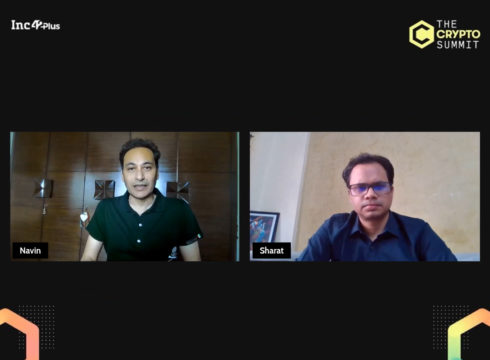Fintech Convergence Council chairman Navin Surya outlines that regulatory bodies such as the SEBI and the RBI have the knowledge, power and capabilities to mitigate risks and are capable regulators when they have accepted cryptocurrencies as the future
The regulators should step back and look at how fiat currencies came into existence — from gold to promise pitch papers — and accept cryptocurrencies in a similar way
Current regulators can divide assets side, trading side and issuance of securities for crypto among themselves for a faster implementation
Inc42 Daily Brief
Stay Ahead With Daily News & Analysis on India’s Tech & Startup Economy
Speaking at one of the fireside sessions of India’s largest Crypto Summit organised by Inc42 Plus, Navin Surya, Chairman, Fintech Convergence Council, sheds light on how the government has changed its approach towards cryptocurrencies.
“Three years ago, the government was of the opinion of banning cryptocurrencies. Now, while they are quite unclear, they are accepting cryptocurrency as a commodity,” Surya said during the session — ‘Demystifying All Things Crypto’ moderated by Sharat Chandra, Blockchain & emerging tech evangelist.
Talking about the need for regulations to instil trust in a user, Surya outlines that regulatory bodies such as SEBI and RBI have the knowledge, power and capabilities to mitigate risks as they have experience with regulating the tech for Customer Service Point (CSP), Know Your Customer (KYC) and Prevention of Money Laundering Act (PMLA).
“They have also seen and managed risks in products like options, futures, commodities trading, forex trading,” he said, adding that this makes them capable of providing regulation for cryptocurrencies and it is only a matter of acceptance on part of these regulators.
The regulators should step back and look at how fiat currencies came into existence, Surya commented. “At one point in history, some authorities must have decided that they wanted to stop dealing in gold and converted it into fiat currency. People, even then, must have been aghast at having to use a promise-pitch-paper,” he added.
“But people started adopting the fiat currency movement, and gradually, even though the papers are no longer backed in the value of the gold, people use it. It is a big leap of faith and we are in the same boat again,” Surya said.
Answering the question of whether India needs a separate regulator or the current regulators are equipped enough, Surya outlined that one way we can look at it is like the US — dividing the currencies into three parts — assets side, trading side and issuance of securities.
Subject to RBI, the important thing to note here would be that cryptocurrencies be looked at from a technology point of view as they will need close monitoring, but a faster route would be to divide the above three parts among existing regulators, Surya stated. “But, CBDC is very clear that it [the regulatory control] should go to RBI,” he commented.
Note: We at Inc42 take our ethics very seriously. More information about it can be found here.


